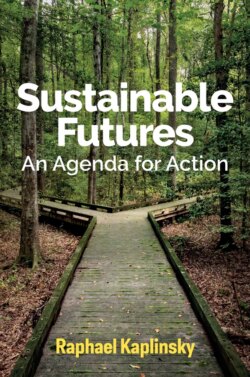Читать книгу Sustainable Futures - Raphael Kaplinsky - Страница 14
ОглавлениеAcknowledgements
During the course of my professional life, I have been privileged to work with three truly inspirational colleagues. Their contributions play a central role in the ideas advanced in this book.
The late Chris Freeman mentored my early career development and alerted me to the centrality of innovation in the unfolding of history.1 Chris was resolute in his belief that technologies are socially created, and are hence malleable. Thus, he argued, we have a choice about the nature and trajectory of the society we live in. This choice, however, is frequently obscured by disciplinary silos and a belief in technological determinism. In the early 1980s, Chris pioneered the theory of ‘long waves’, which is the analytical structure I have drawn on and extended in order to analyse our contemporary crises in sustainability.
I worked with the late Robin Murray for more than two decades. Robin was an inspirational teacher and a visionary colleague.2 Amongst the imprints he left on me was the understanding that distributed power, robust communities and civic participation are the foundations of a more socially and environmentally sustainable world. Robin helped me to realize that more inclusive societies not only are normatively desirable, but can also be more ‘efficient’ and are, hence, feasible. He was a pioneer in the development of ideas about the Circular Economy and the urgent need to take action to avoid a looming environmental crisis.
More recently, I have had the pleasure and privilege of working closely with Carlota Perez.3 Carlota collaborated with Chris Freeman in extending long wave theory from its preoccupation with economic trajectories to an analysis of the co-evolution of technology, economy and society. Subsequently, she elaborated this framework to take account of the role which finance plays in the unfolding rise and atrophy of techno-economic paradigms. Drawing on insights gained from an understanding of the evolution of past techno-economic paradigms, Carlota provides us with a vision of what a more sustainable world might look like as the new Information and Communications techno-economic paradigm is deployed. But, she argues, this can only be achieved through purposeful action, particularly by visionary and effective governments. Carlota has stood by my side throughout the drafting and redrafting of this book. We have put on weight during our long lunches, and she has read (and sometimes reread) my draft chapters.
Although I have leant heavily on the contributions of these three colleagues, I take responsibility for the views expressed in this book.
My editor at Polity, Jonathan Skerrett, has been exceptional. He helped me to sharpen my focus and to make my material less inaccessible to a non-specialized audience. Shan Vahidy provided an invaluable and highly professional read of an earlier draft, Stevie Holland was my constant foil as an intelligent general reader, and Keith Bezanson provided insightful comments on the complete draft. Annie James (in Delhi) and Courtney Barnes and Chris Grant (both in Cape Town) assisted me with excellence in the processing of some of my data. Leigh Mueller assisted with a close copy-editing of the text. And, of course, the wonderful Wikipedia – how did we manage without it?
A number of colleagues and friends provided data and comments on individual chapters. The list is long. What surfaces as the work of an individual author is always a compilation of the views of others, sometimes absorbed explicitly and at other times seeping into the author’s unconscious through the ether. So here are the culprits (in alphabetical order):
Andreas Antoniades (Chapter 2), Mike Boulter (Chapter 4), Tim Foxon (Chapter 4), Stephany Griffiths Jones (Chapter 2), James Hampshire (Chapter 3), Tim Jackson (Chapter 4), Richard Jolly (Chapters 2 and 3), Giorgos Kallis (Chapter 4), David Kaplan (Chapter 2), Bill Lazonick (Chapter 2), Rasmus Lema (Chapter 7), Paul Lewis (Chapter 3), Mathew Lockwood (Chapter 4), Mariana Mazzucato (Chapter 2), Erik Millstone (Chapter 4), Mike Morris (Chapters 3, 7, 8 and 9), Dev Nathan (Chapter 4), Hubert Schmitz (Chapter 2), Benjamin Sovacool (extensive assistance with Chapters 4 and 7), Mark Stroud (Chapter 7), Nikos Vernardakis (Chapter 2), Sam Watson-Jones (Chapter 7), Richard Wilkinson (Chapter 3) and Martin Wolf (Chapter 2).
I apologize to my family, Hugh Fowler, Jenny Higgo, Jim Roby, Karen Fowler, Kate Springford, Leslye Orloff and Penny Leach for spoiling your meals during the development of my ideas. I owe you all a drink (or two).
And finally, my wife, Cathy. Like most authors, I have been a grumpy and distracted companion as I ploughed my way through drafts and redrafts. Cathy has been an insightful intellectual companion, not only encouraging me to avoid beginning sentences with ‘But’ and ‘And’ and to reduce sentence length, but, more importantly, with the development and elaboration of my ideas. She is too tactful to say so, but I am sure she is even more relieved than I am that the book has eventually been completed. I cannot measure her generous assistance.
Notes
1 1 http://freemanchris.org/publications.
2 2 https://robinmurray.co.uk.
3 3 www.carlotaperez.org.
